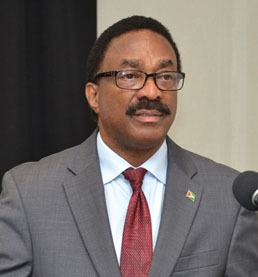The National Assembly yesterday passed amendments to the anti-money laundering legislation, which included replacing the Anti-Money Laundering Authority with a coordinating committee that raised eyebrows and a lot of questions among opposition Members of Parliament (MPs).
Following four hours of debate, the government used its majority to pass the Anti-Money Launde-ring and Countering the Financing of Terrorism (Amendment) Bill 2018.
It is the fourth bill amending the legislation to be passed in three years.
Among the changes that will be effected by the bill is the dismantling of the Anti-Money Laundering Authority, which will be replaced by the Anti-Money Laundering and Countering the Financing of Terrorism and Proliferation Financing (AML/CFT/PF) National Coordination Committee.

Surprisingly, Attorney General (AG) Basil Williams argued during his presentation on the bill that he did not know who proposed either the “top heavy” authority or its functions, although it was he, who on June 26th, 2015, successfully piloted the bill to establish the body.
However, in presenting the amendments last evening, Williams argued that they would “strengthen what already exists and provide the foundation for [Guyana] to demonstrate that [its] systems and policies are effective.”
He noted that in particular the amendments for the coordination committee would satisfy a Financial Action Task Force (FATF) recommendation that countries should designate an authority to have a coordination or other mechanism that is responsible for national AML/CFT/PF policies.
Though the authority had been put in place to serve this function, Williams reported that the Caribbean Financial Action Task Force (CFATF) indicated to government in January that it was too narrow in scope and applied solely to the Financial Intelligence Unit (FIU).
The AG’s arguments did not find favour with the opposition speakers, who stressed that it was in his best interest to be honest since citizens remember who did what in the last Parliament.
PPP/C MP Juan Edghill specifically noted that verbatim records from January to May 2014 saw the now government strenuously arguing for the authority, while former AG and fellow PPP/C MP Anil Nandlall criticised government’s attempt to distance itself from the authority, noting “It’s as if they don’t care about their credibility anymore.”
Edghill noted that while the new committee is supposed to be strengthening the AML/CTF regime, it does not include such members as the Commissioner of Police, the Solicitor-General, the Customs and Anti-Narcotics Unit or the Registrar of Deeds.
Additionally, he said the committee is to be chaired by the AG, who has given himself special powers, such as that of paymaster, since the newly amended section 7B (2) empowers the chair to pay salary and other benefits to members of the committee, which is to report to the Minister of Finance.
Edghill argued that in crafting the proposed legislation, the AG has made himself subservient to the Finance Minister and created an environment ripe for political interference.
Opposition backbencher Harry Gill also questioned whether it made sense to have the AG chair a committee which deals primarily with financial issues. He argued that Williams might need two or three financial advisors and questioned if government was comfortable having the current AG hold a post outside his area of qualification when his record in his own field was “dismal.”
Opposition Chief Whip Gail Teixeira continued the attack, labelling the bill a reprehensible piece of legislation.
Nandlall went further, arguing that it was never intended for the committee to be part of the legislation.
He noted that in 2014, the then opposition was informed that the authority would not be suitable. “We said to them [APNU] if you put this top heavy body over the FIU, you are undermining the autonomy and independence of that unit, which is so central to its core functions, which would be problematic at the level of international requirement,” Nandlall said, while adding that there was a coordinating committee under the previous administration.
“We had the same thing and it is a requirement; it used to be called the National Task Force and was run out of Dr [Roger] Luncheon’s office because it is not a formal part of the AML/CFT structure. It was not intended to be in the legislation. It’s an advisory body on national policy that brings together the relevant players to coordinate, so we don’t have the conflict which you now have between the FIU and SOCU, SOCU and GRA, SOCU and commercial banks and SARA,” Nandlall explained. “It was not intended to be intrinsic but extrinsic, so it is wrongly placed there again…it was supposed to be ad hoc, not intended to create another monstrosity of bureaucracy to waste taxpayer money,” he added.
He went on to question what payment the AG has been empowered to make to the members of the committee, who are all salaried public officials and why they have been made exempt from paying all taxes.
Despite these concerns, the amendments, including those related to the committee, were passed by the House.
Members of the committee, according to the new bill, are: the AG, who will be the Chairperson, the Director of Public Prosecutions (DPP), the Governor of the Bank of Guyana, the Commissioner-General of the Guyana Revenue Authority, the Director of the FIU, the head of the Special Organised Crime Unit, the General Manager of the Guyana Gold Board, the Commissioner of the Guyana Geology and Mines Commission, the Chairperson of the Guyana Securities Council, the Chairperson of the Gaming Authority and the Chief Co-operatives and Development Officer.
According to the bill, some of the functions of the committee include developing national AML/CFT/PF policies informed by the risks identified by the recently completed National Risk Assessment (NRA) and to develop a national action plan, which includes recommendations on effective mechanisms to enable the competent authorities in Guyana to cooperate and coordinate with each other concerning the development and implementation of policies and activities to combat money laundering terrorist financing and proliferation financing.





